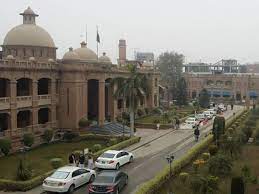Syed Adnan
PESHAWAR: As the dust settles following the conclusion of the elections across the nation and its provinces, all eyes turn to the impending formation of the new government in the Province of Khyber Pakhtunkhwa. With Pakistan Tehreek-e-Insaf emerging victorious and securing a majority, speculation mounts regarding the composition of the incoming administration and the anticipated reshuffling of bureaucrats.
Amidst the fervor of political transitions, PTI-backed politicians prepare to usher in a new era, with the party announcing Ali Amin Gandapur as the presumptive Chief Minister. With the Provincial Assembly set to convene in the coming weeks for the swearing-in ceremony, expectations run high for significant changes within the bureaucratic landscape.
Foremost among the anticipated reforms is the reshuffle of key administrative positions, including secretaries, commissioners, deputy commissioners, and assistant commissioners. The incoming government is poised to instigate a comprehensive overhaul, aiming to infuse fresh leadership and align administrative structures with its policy agenda.
Notably, the police department is also slated for transformation, with potential changes looming for District Police Officers and Regional Police Officers. Sources suggest that incumbents perceived as obstructive or non-aligned with PTI’s vision may face reassignment.
Moreover, speculation surrounds the imminent transfer of the Chief Secretary and Inspector General of Police, both of whom have been perceived as adversarial to PTI interests. Citing alleged bias and ineffectiveness in managing administrative affairs, proponents of change advocate for their replacement to rejuvenate governance mechanisms and bolster PTI’s agenda implementation.
In addition to the reshuffle of high-profile positions, attention is drawn to the emergence of sidelined officers poised for elevation to prominent administrative roles.
Amidst the anticipation of administrative reshuffling, it is imperative to acknowledge the invaluable contributions of numerous diligent and competent officers currently serving in various capacities. These dedicated individuals have demonstrated unwavering commitment and proficiency in their roles, tirelessly working to uphold the principles of good governance and public service.
As the new government takes shape, it is essential to ensure that these exemplary officers are duly recognized and compensated for their hard work and dedication. Their experience, expertise, and integrity are invaluable assets that can greatly contribute to the effective functioning of the administration and the realization of developmental objectives. Therefore, their inclusion and recognition in the forthcoming administrative framework are not only warranted but also vital for fostering continuity, stability, and excellence in governance.
As the transition unfolds, stakeholders await the official announcement of appointments and transfers, poised to witness the unfolding of a new chapter in Khyber Pakhtunkhwa’s governance landscape. With expectations high for reform and revitalization, the incoming administration faces the daunting task of translating electoral mandates into tangible progress, heralding a period of anticipation and transformation in the province.







